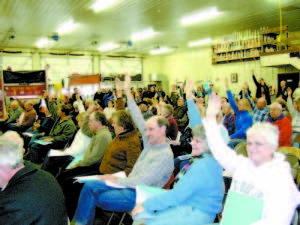Oil execs lobbying falls short at Waterford town meeting
By Gail Geraghty
Staff Writer
WATERFORD — Oil pipeline industry officials had their first chance Saturday at Waterford Town Meeting to give over 100 residents their side of the story in the growing anti-tar sands controversy that may spread to over 50 towns before long.
But while Town Meeting Moderator Sawin Millett made sure the nonresidents, who included Portland-Montreal Pipe Line President/CEO Larry Wilson, and a representative of the Canadian Consulate, were given the chance to speak that was denied to them in Bethel, in the end it was the voice of anti-tar sands activists that carried the day.
After a two-vote result defeated a motion to table the resolution to a later date so more meetings could be held, residents passed by a 56–34 vote a nonbinding resolution calling for a full environmental impact study of threats posed by tar sands transmission before any decisions are made.
Waterford is the third Maine town to take an official stand opposing the pipeline’s use for tar sands delivery. Casco and Bethel, is part of the first wave of Maine towns taking a stand against allowing the 60-year-old pipeline, owned by Exxon-Mobil, to be used for delivery of Canadian oil sands, even though industry officials say there are no plans to do so.
Bethel’s resolution passed after just a 15-minute debate at a Jan. 30 Special Town Meeting that was shut down abruptly when someone called the question, requiring an immediate vote.
For over two hours, the officials tried to persuade voters against passing a nonbinding resolution they said should more transmission of tar sands, known technically as diluted bitumen. Their arguments were given credence and support from several well-respected local businessmen who owe much of their livelihoods to the longstanding business relationship their companies have had with the pipeline corporation, providing maintenance and construction services.
The pipeline stretches 7.8 miles through Waterford along the Crooked River watershed, crossing the river five times. The pipeline also passes by both Papoose and McWain Ponds in Waterford.
The resolution was submitted by Waterford residents who presented the resolution to selectmen in December and asked for it to be placed before voters at Town Meeting. One of the group’s leaders, Paula Easton, cried in relief after the vote was read.
“I have been thrilled to see so many Waterford residents attending community presentations over the past few months to educate themselves about tar sands oil and how it would affect us here in town,†she said. “There is a lot of misinformation out there. I’m glad folks got the facts before they voted.â€
Easton said the requirements of an environmental impact review can be met by the U.S. State Department for cross-border pipelines. More than 50 towns along the pipeline route in Maine, New Hampshire and Vermont are considering similar resolutions.
“After hearing from experts on both sides, and after more than an hour of discussion, the people of Waterford have spoken,†Waterford Selectmen Chairman Randy Lessard said. “We feel as a town that transporting tar sands oil through the Portland-Montreal pipeline poses unpredictable risks to the health, safety, natural resources, property and economic welfare of Waterford residents.â€
The resolution stated concerns about the environmental and public health hazards of tar sands in the context of a town and region heavily dependent on a clean environment for recreation, tourism, and the economy at large. Concerns about threats to water quality also motivated the resolution.
“As a landowner of 480 acres along the Crooked River and a mile of land that the pipeline traverses in Waterford, my land would be directly affected should tar sands be pumped through the Portland Montreal Pipeline,†Waterford resident Bart Hague said. “A tar sands oil spill in the wetland habitat along the Crooked River would be nearly impossible to clean up since tar sands is heavier and thicker than conventional oil.â€
Waterford resident and retired scientist and educator Earl Morse told residents that the 7.8-mile section of the pipeline that runs through Waterford holds nearly a million gallons of oil, and “if this antiquated, 62-year-old pipeline ruptured like what happened in Kalamazoo, Michigan in July 2010, the Crooked River watershed and Sebago Lake would be devastated.â€
“We are in full support of the resolution passed by Waterford voters today at town meeting, says Colin Holme, Assistant Director of the Lakes Environmental Association. “The well-being of the town and its citizens would be directly impacted by any such proposal to pump tar sands oil through the Sebago Lake region and their voices should be heard. LEA strongly urges a formal environmental review of any proposal to transport these materials through the Sebago Lake Watershed.â€
“We congratulate the town and citizens of Waterford on passing this important resolution,†said Todd Martin, Outreach Coordinator for the Natural Resources Council of Maine. “Once you learn about tar sands and pipelines, it’s not hard to see that it would be a bad deal for Maine. We expect dozens of other towns along the pipeline to speak out in the coming months.â€


